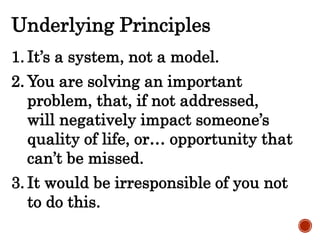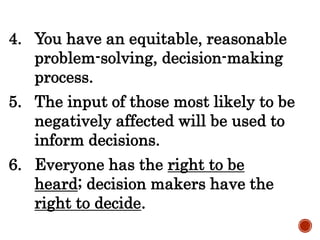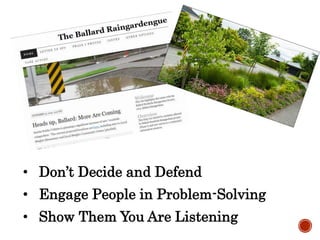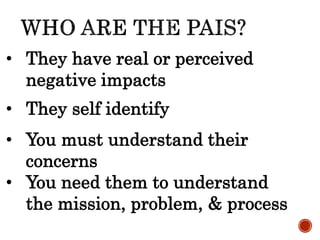Informed_Consent_Overview
- 1. KEEP YOUR PROJECT ON TRACK WITH INFORMED CONSENT January 13, 2016
- 4. Underlying Principles 1. It’s a system, not a model. 2. You are solving an important problem, that, if not addressed, will negatively impact someone’s quality of life, or… opportunity that can’t be missed. 3. It would be irresponsible of you not to do this.
- 5. 4. You have an equitable, reasonable problem-solving, decision-making process. 5. The input of those most likely to be negatively affected will be used to inform decisions. 6. Everyone has the right to be heard; decision makers have the right to decide.
- 6. • Don’t Decide and Defend • Engage People in Problem-Solving • Show Them You Are Listening
- 7. 1. There is a serious problem (or important opportunity) – one that just has to be addressed 2. We are the right agency to address it. (In fact, given our mission, it would be irresponsible if we didn’t address the problem/opportunity.) 3. The approach we are using is reasonable, sensible, responsible, and equitable. 4. We are listening. We do care.
- 8. Seward Park CSO Reduction Project
- 9. • They have real or perceived negative impacts • They self identify • You must understand their concerns • You need them to understand the mission, problem, & process
- 10. Your Project
- 11. • People who have already expressed opposition • People who expect to be consulted, informed, engaged • People who are most likely to experience real or perceived negative impacts • People who e-mail/call elected officials • People who write letters to the editor • People who create blogs
- 12. • People who are considered outliers even in their own community • People who do not believe there is a problem or opportunity • People who are already supportive • People included just to represent a particular stakeholder group • Reporters or bloggers
- 13. Object-Related Values Process-Related Values: Fairness Meta-Values: Rights, Freedoms, Liberties Meta-Meta-Values: Limitations of Rights, Freedoms, Liberties
- 14. • Grudging willingness of opponents to “go along” with something to which they are naturally opposed • Informed Consent is not natural • Over-My-Dead-Body Opposition is natural • Has to be developed systematically using objectives- driven outreach and communication • Depends on achieving at least the four Life Preserver Objectives
- 15. 1. There is a serious problem (or important opportunity) – one that just has to be addressed. 2. We are the right agency to address it. In fact, given our mission, it would be irresponsible if we didn’t address the problem/opportunity. 3. The approach we are using is reasonable, sensible, responsible and equitable. 4. We are listening. We do care.















